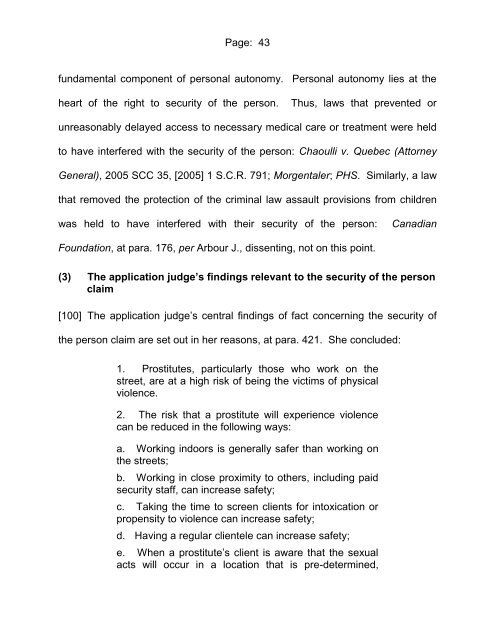Canada (Attorney General) v. Bedford, 2012 ONCA ... - York University
Canada (Attorney General) v. Bedford, 2012 ONCA ... - York University
Canada (Attorney General) v. Bedford, 2012 ONCA ... - York University
You also want an ePaper? Increase the reach of your titles
YUMPU automatically turns print PDFs into web optimized ePapers that Google loves.
Page: 43fundamental component of personal autonomy. Personal autonomy lies at theheart of the right to security of the person.Thus, laws that prevented orunreasonably delayed access to necessary medical care or treatment were heldto have interfered with the security of the person: Chaoulli v. Quebec (<strong>Attorney</strong><strong>General</strong>), 2005 SCC 35, [2005] 1 S.C.R. 791; Morgentaler; PHS. Similarly, a lawthat removed the protection of the criminal law assault provisions from childrenwas held to have interfered with their security of the person:CanadianFoundation, at para. 176, per Arbour J., dissenting, not on this point.(3) The application judge’s findings relevant to the security of the personclaim[100] The application judge‟s central findings of fact concerning the security ofthe person claim are set out in her reasons, at para. 421. She concluded:1. Prostitutes, particularly those who work on thestreet, are at a high risk of being the victims of physicalviolence.2. The risk that a prostitute will experience violencecan be reduced in the following ways:a. Working indoors is generally safer than working onthe streets;b. Working in close proximity to others, including paidsecurity staff, can increase safety;c. Taking the time to screen clients for intoxication orpropensity to violence can increase safety;d. Having a regular clientele can increase safety;e. When a prostitute‟s client is aware that the sexualacts will occur in a location that is pre-determined,
















